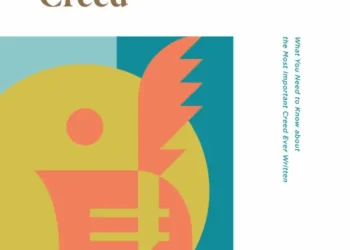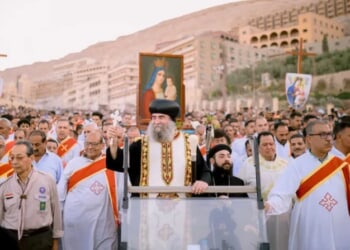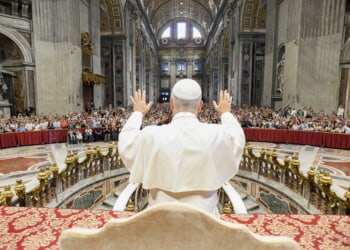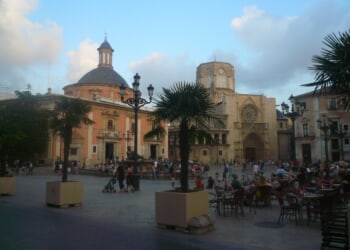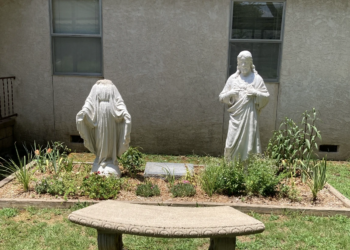Washington, D.C. Newsroom, Aug 15, 2025 /
11:13 am
A new initiative launched by the Catholic Diocese of San Diego and its interfaith partners is offering accompaniment and a spiritual presence for migrants and asylum seekers at their immigration hearings in Southern California.
The program — Faithful Accompaniment in Trust & Hope (FAITH) — was launched on Aug. 4 amid the increasing number of deportations within California and nationwide amid President Donald Trump’s immigration crackdown.
“They’re walking into a whole building and system that’s against them,” Jesuit Father Scott Santarosa, who is leading the FAITH program, told CNA.
FAITH is primarily led by three partners: the diocese, which sits right along the southern border; Our Lady of Guadalupe Catholic Parish in Barrio Logan, which is 15 miles from the border and of which Santarosa is the pastor; and the multifaith San Diego Organizing Project (SDOP).
The program enlists volunteers of several faiths to accompany people before, during, and after immigration court appearances. As of Aug. 14, about 100 people have signed up to volunteer from seven faith groups: Catholics, Episcopalians, Lutherans, Unitarian Universalists, Muslims, members of the United Church of Christ, and members of the Church of the Nazarene.
Santarosa said the main priority is to “be present accompanying migrants to court” and to “be a prayerful presence with them and for them.”
A person who is scheduled to appear at an immigration hearing can sign up to have a volunteer accompany him or her within the courtroom and, if he or she chooses, meet with a volunteer before or after the hearing to pray with or simply speak with the volunteer.
Santarosa said only 10-20 people awaiting hearings have signed up to meet up with volunteers over the last two weeks but added: “I think that number will go up — I hope it does.” He noted that if the volunteer is requested ahead of time, that volunteer will “have a little more standing in the eyes of the court … [and the judge] may allow us to sit in on a migrant’s case.”
At this stage of the program, most of the volunteers are attending in groups and then breaking apart to offer a presence at hearings that are open to the public. Some remain in the hallways, Santarosa noted, because Immigration and Customs Enforcement (ICE) is sometimes “waiting to arrest people whose cases have been dismissed.”
“Even when we don’t know the person … we’ve had people really express a lot of gratitude that we’ve been there,” Santarosa said.
Bishop Michael Pham and the diocesan auxiliary bishops are among the volunteers who have provided accompaniment at the courthouse.
Santarosa said a lot of volunteers speak Spanish and the program also has one volunteer who speaks Vietnamese and another, an imam, who speaks Arabic. He said he also hopes to find volunteers who speak Haitian Creole and others who speak Mandarin Chinese.
He noted that many people appreciate the ability to converse in their native language, noting that on the first day one person awaiting a hearing “didn’t have a lawyer and the imam stood up to talk with him … in one of his native languages and that was a comfort to him.”
Initiative inspired by the Gospel, diocesan incidents
Prior to launching the program, the diocese celebrated a Mass on June 20 for International Refugee Day, after which the bishop, some priests, and others went to the courthouse to offer accompaniment to people awaiting immigration hearings.
The diocese had a sign-up sheet for anyone who would like to volunteer to accompany migrants at the courthouse, which yielded about 100 signatures and ultimately led to the FAITH program.
(Story continues below)
Subscribe to our daily newsletter
When asked about the motivation for the initiative, Santarosa said it’s “not enough to just have thoughts and prayers” and that “Jesus expects us to actually take care of [people’s] physical needs.”
“I think there’s a … mandate in that Gospel that we need to put our faith into action,” he added.
Santarosa referenced Matthew 25: “For I was hungry and you gave me food, I was thirsty and you gave me drink, a stranger and you welcomed me,” which Jesus says to his disciples when speaking about those who will inherit the kingdom of heaven.
“Amen, I say to you, whatever you did for one of these least brothers of mine, you did for me,” Jesus Christ says in the Gospel passage.
Santarosa also spoke about specific diocesan needs, noting that two parishioners have been deported within the past six months. He also personally accompanied one of his parishioners to two immigration hearings at her request and helped her get a lawyer to assist with filling out her asylum request paperwork.
Since the San Diego Diocese launched the program, Santarosa said other dioceses have reached out to ask for details about how to implement the program. He encouraged other dioceses to start similar programs, saying: “It’s really not that complicated” and “people of goodwill and the faithful” will volunteer.
“I think it’s a great thing for clerics, for [Church] leaders, and for laypeople to do,” Santarosa said.





